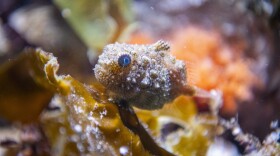A group of allergy researchers in Seattle is releasing new recommendations that mark a complete turnaround from the conventional wisdom on when to introduce peanut products to babies. The guidelines come in the wake of a recent major study.
Doctors used to say parents shouldn’t let kids even try peanuts until age three. The American Academy of Pediatrics dropped that advice after incidence of peanut allergy continued to climb, quadrupling between 1997 and 2010.
But then this big study called Learning Early About Peanut Allergy, or LEAP, tested a new approach: introducing peanuts to high-risk infants much earlier – between four and eleven months.
Dr. William Henderson says the results, published in February, floored him.
“It was the most amazing results,” said Henderson, Head of Allergy at UW Medicine. “There was an 86 percent reduction in developing peanut allergy compared to the same group that had avoided peanuts over that period. This was truly unheard of.”
Big national and international medical societies are revamping their guidelines and will likely release new ones within a year or so. But the Seattle Food Allergy Consortium says with babies at risk of developing the allergy now, there’s no reason to wait.
“We all met as a group we decided this was so compelling we really need to get it out to our community of children with a high risk for developing food allergy. Because this is an intervention that would prevent it,” Henderson said.
They’re issuing their own guidance, recommending babies who meet certain criteria get peanuts in those early months (they emphasize, though, that parents should consult their doctors and not act on their own). Infants who already display the allergy would not be given peanut protein.
The Consortium is made up of doctors and researchers at UW Medicine, Northwest Asthma and Allergy, Virginia Mason and Seattle Children’s.







